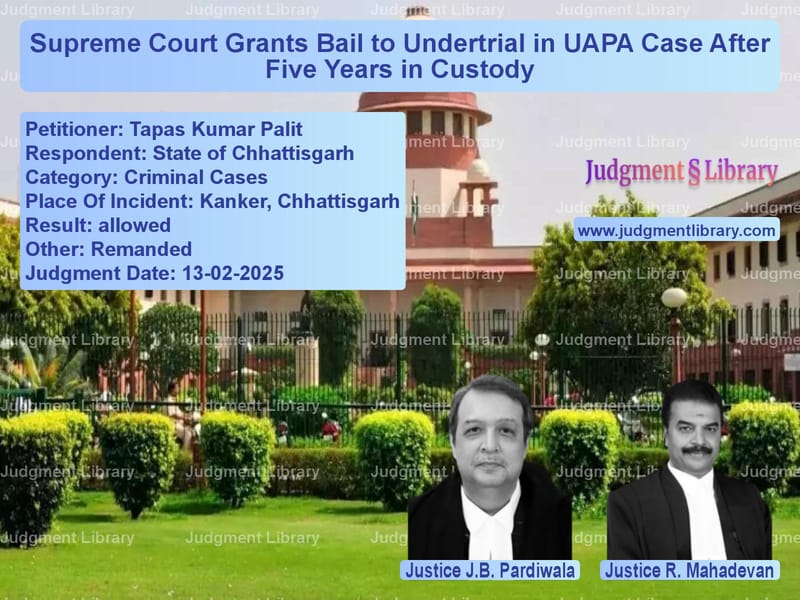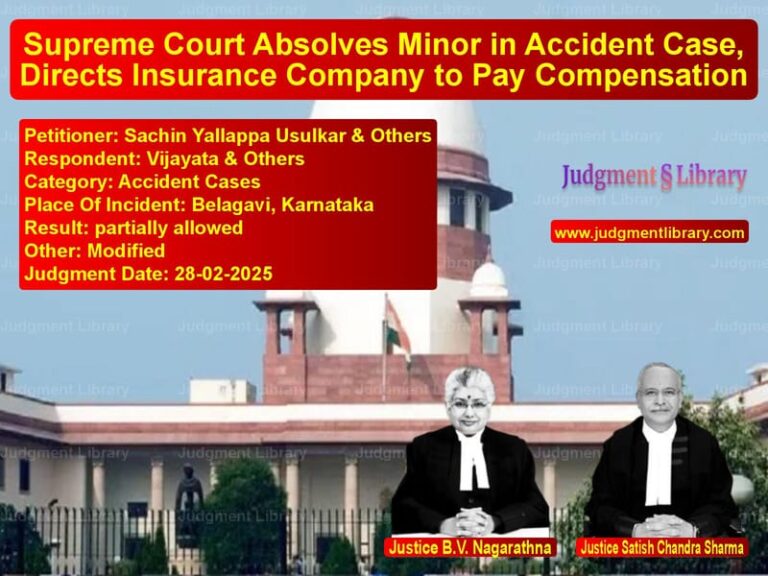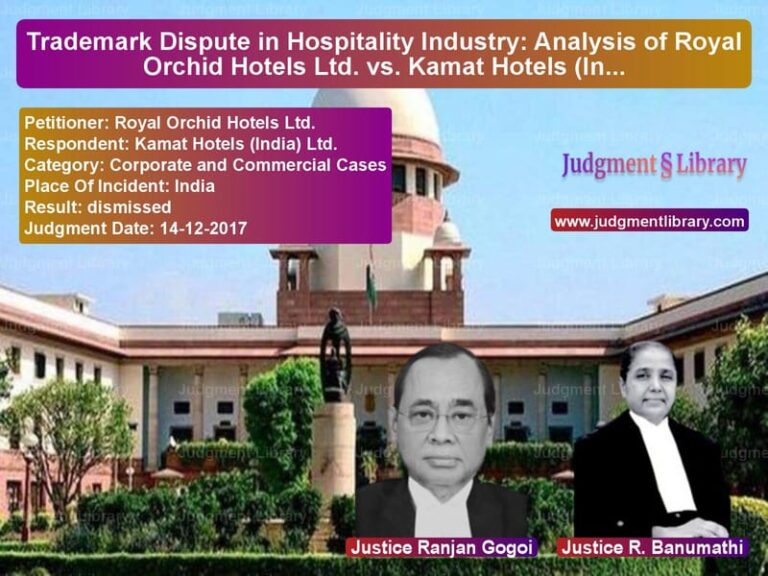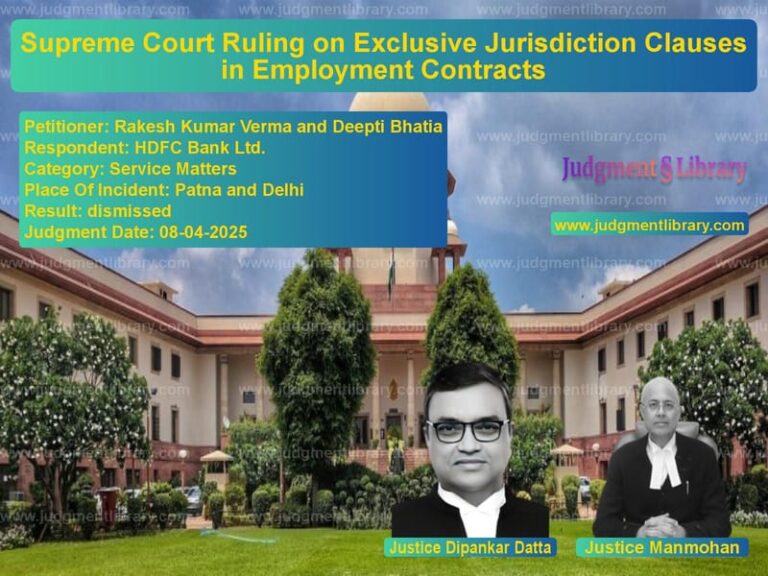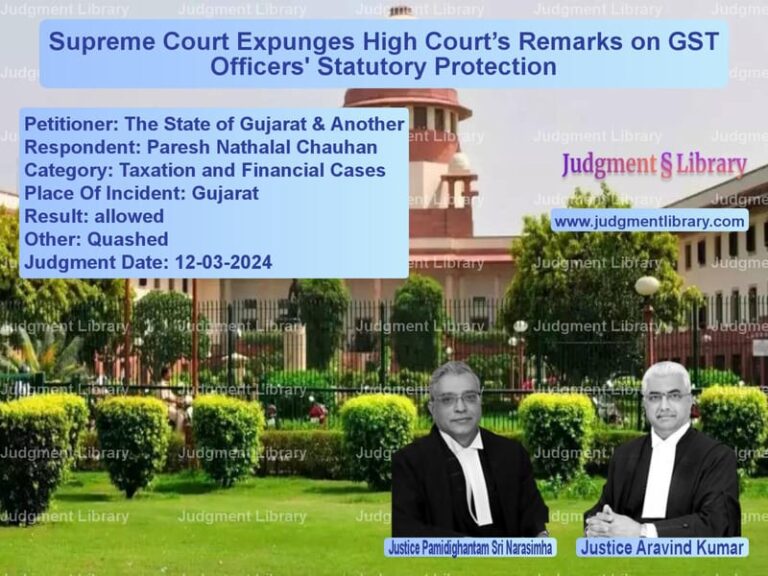Supreme Court Grants Bail to Undertrial in UAPA Case After Five Years in Custody
The case of Tapas Kumar Palit vs. State of Chhattisgarh highlights an important ruling by the Supreme Court regarding prolonged undertrial detention under the Unlawful Activities Prevention Act (UAPA), 1967. The appellant had been in custody for five years without bail, and the Court emphasized the accused’s right to a speedy trial under Article 21 of the Constitution.
Background of the Case
Tapas Kumar Palit was arrested on March 24, 2020, for allegedly transporting materials suspected to be used for Naxalite activities. The police intercepted his vehicle based on prior intelligence and recovered:
- 95 pairs of shoes
- Green-black printed cloth
- Two bundles of 100-meter electric wire
- LED lens
- Walkie-talkie and other articles
Following his arrest, a charge sheet was filed under multiple provisions of:
- Unlawful Activities Prevention Act (UAPA), 1967 – Sections 10, 13, 17, 38(1)(2), 40, 22-A, and 22-C
- Chhattisgarh Vishesh Jan Suraksha Adhiniyam, 2005 – Sections 8(2), (3), and (5)
- Indian Penal Code (IPC), 1860 – Sections 120B (criminal conspiracy), 201 (causing disappearance of evidence), 149 (unlawful assembly) read with 34 (common intention).
Legal Proceedings and High Court Ruling
The appellant applied for bail before the Chhattisgarh High Court, arguing that he had been falsely implicated and that the materials recovered were not incriminating. However, the High Court denied bail on February 16, 2024, stating:
- The materials recovered were typically used by Naxalite groups.
- The case fell under the stringent provisions of UAPA, making bail difficult.
- The investigation and evidence presented by the prosecution justified continued detention.
Aggrieved by this, the appellant approached the Supreme Court.
Arguments Before the Supreme Court
Petitioner’s (Tapas Kumar Palit) Arguments
The petitioner’s counsel contended:
- The appellant had been in custody for five years without trial completion.
- The UAPA’s stringent bail conditions should not override the fundamental right to a speedy trial.
- 42 out of 100 prosecution witnesses had been examined, and the remaining trial proceedings would take years to complete.
- Many panch witnesses had turned hostile, weakening the prosecution’s case.
- The materials recovered were not weapons or explosives but generic items that had multiple uses.
Respondent’s (State of Chhattisgarh) Arguments
The state’s counsel argued:
- The items found in the appellant’s possession were commonly used by Naxalite groups to support their operations.
- The gravity of offenses under UAPA justified extended custody.
- The ongoing trial was delayed due to multiple factors, including the COVID-19 pandemic.
- The prosecution needed to examine 100 witnesses to establish the case beyond doubt.
Supreme Court’s Observations
The Supreme Court, led by Justices J.B. Pardiwala and R. Mahadevan, considered whether continued detention was justified given the delays in the trial. The Court made the following key observations:
“An accused has a fundamental right to a speedy trial under Article 21 of the Constitution. Howsoever serious a crime may be, prolonged incarceration without trial completion is an infringement of this right.”
The Court also addressed the prosecution’s plan to examine 100 witnesses and criticized unnecessary delays:
“The public prosecutor must use discretion in selecting witnesses. No useful purpose is served if multiple witnesses are examined for the same fact. This results in indefinite delays.”
Judicial Precedent on Speedy Trials
The Supreme Court referred to Hussainara Khatoon v. State of Bihar (1979), where it held that prolonged undertrial detention violated fundamental rights. It also cited Union of India v. K.A. Najeeb (2021), which ruled that courts must balance national security concerns with an accused’s right to bail.
Read also: https://judgmentlibrary.com/supreme-court-commutes-death-sentence-in-karnataka-double-murder-case/
Final Judgment
The Supreme Court ruled:
- The appellant was granted bail, reversing the High Court’s decision.
- The bail was subject to conditions, including:
- Not entering Kanker district, Chhattisgarh, during the trial.
- Appearing for hearings online unless physical presence was necessary.
- Providing a surety bond as determined by the trial court.
- Not tampering with evidence or contacting prosecution witnesses.
- If the appellant breached these conditions, the bail would be automatically canceled.
Key Takeaways
- Right to a Speedy Trial: The ruling underscores the judiciary’s commitment to preventing prolonged undertrial detention.
- Judicial Oversight on Trial Delays: The Court criticized excessive prosecution witness lists that unnecessarily delay proceedings.
- Balancing National Security and Individual Rights: The ruling reaffirms that stringent laws like UAPA must not be misused to justify indefinite detentions.
- Prosecutor’s Role in Expediting Cases: The Court emphasized that public prosecutors must avoid unnecessary witness examinations that prolong trials.
Conclusion
The Supreme Court’s judgment in this case serves as a reminder that even in cases involving national security laws, an accused’s fundamental rights must be upheld. The Court’s decision to grant bail highlights the necessity of ensuring trials proceed efficiently, without undue delays, while maintaining the integrity of the justice system.
Petitioner Name: Tapas Kumar Palit.Respondent Name: State of Chhattisgarh.Judgment By: Justice J.B. Pardiwala, Justice R. Mahadevan.Place Of Incident: Kanker, Chhattisgarh.Judgment Date: 13-02-2025.
Don’t miss out on the full details! Download the complete judgment in PDF format below and gain valuable insights instantly!
Download Judgment: tapas-kumar-palit-vs-state-of-chhattisgar-supreme-court-of-india-judgment-dated-13-02-2025.pdf
Directly Download Judgment: Directly download this Judgment
See all petitions in Bail and Anticipatory Bail
See all petitions in Custodial Deaths and Police Misconduct
See all petitions in Terrorist Activities
See all petitions in Public Interest Litigation
See all petitions in Judgment by J.B. Pardiwala
See all petitions in Judgment by R. Mahadevan
See all petitions in allowed
See all petitions in Remanded
See all petitions in supreme court of India judgments February 2025
See all petitions in 2025 judgments
See all posts in Criminal Cases Category
See all allowed petitions in Criminal Cases Category
See all Dismissed petitions in Criminal Cases Category
See all partially allowed petitions in Criminal Cases Category

